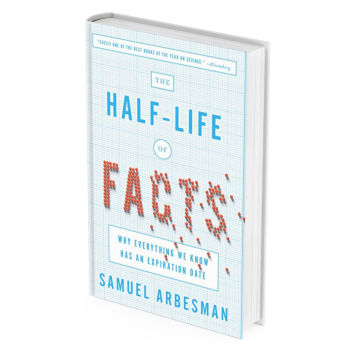
“It is unfortunate that it is possible to 'know' something that is not true.”
~ Mokokoma Mokhonoana
You don’t have to go too far back into human history to find examples of ‘facts’ – widely held beliefs – that today we would find a bit silly: The World is flat, at the center of the universe and a few thousand years old, for example. In more recent history, smoking was prescribed by doctors for its health benefits, and asbestos was considered to be a safe building material. Duh?
It’s easy to discount these ‘facts’ because they are so well established as fiction now, but it might surprise you to know that most facts have a lifespan of only a few decades at best. Studies of scientific knowledge have revealed that facts actually have a ‘half-life’ (similar to the decay of a radioactive isotope), and around half of what we currently hold as true today will be disproven within about 50 years.
If you haven’t paid much attention to what you learned in school after you graduated, for example, you might still believe that Pluto is the 9th planet in the Solar System, the periodic table has 105 elements, dinosaurs were scaly green lizardy things, and red wine is good for you…bad for you…good for you… oh, who cares?!
Just like the facts we’re taught in school, there are many ‘facts’ we learn about ourselves as we grow up that are also untrue. Perhaps your facts tell you that you’re not good at sport, or it’s rude to say no, or failure is shameful or celebrating success is arrogant, or you’re not very clever, creative, funny, or interesting, or that it’s not possible to be happy, fulfilled or inspired all the time?
The problem with our facts is that we don’t have an army of scientists working around the clock to disprove them, and so many of them go unchallenged and remain ‘facts’ for our entire life, limiting our opportunities and choices as surely as believing the world is flat would.
If half of what you know to be true about yourself is wrong then, what are you going to do about it? You could continue to believe in these untruths and limit your potential. Perhaps ignorance really is bliss? Or, you could do the hard work of beginning to challenge these long-held, deeply embedded but patently untrue facts about yourself and unleash your true potential.
This week’s inquiry…
Which of your 'facts' are you ready to challenge?
Dive Deeper…
Look back through our history, and you’ll find that the idea of “fake news” definitely isn’t new. In fact, there are a ton of theories, stories, and scientific “facts” that we now know were just hot garbage. Making matters worse, some of those facts weren’t simply accepted as truth, but were used as the very building blocks of the world we know today…for better or worse. Usually worse…
“‘Fake news’ is nothing new, and we’ve built the world on it.”
Facts change all the time. Smoking has gone from doctor recommended to deadly. We used to think the Earth was the center of the universe and that the brontosaurus was a real dinosaur. In short, what we know about the world is constantly changing.
Samuel Arbesman shows us how knowledge in most fields evolves systematically and predictably, and how this evolution unfolds in a fascinating way that can have a powerful impact on our lives.


